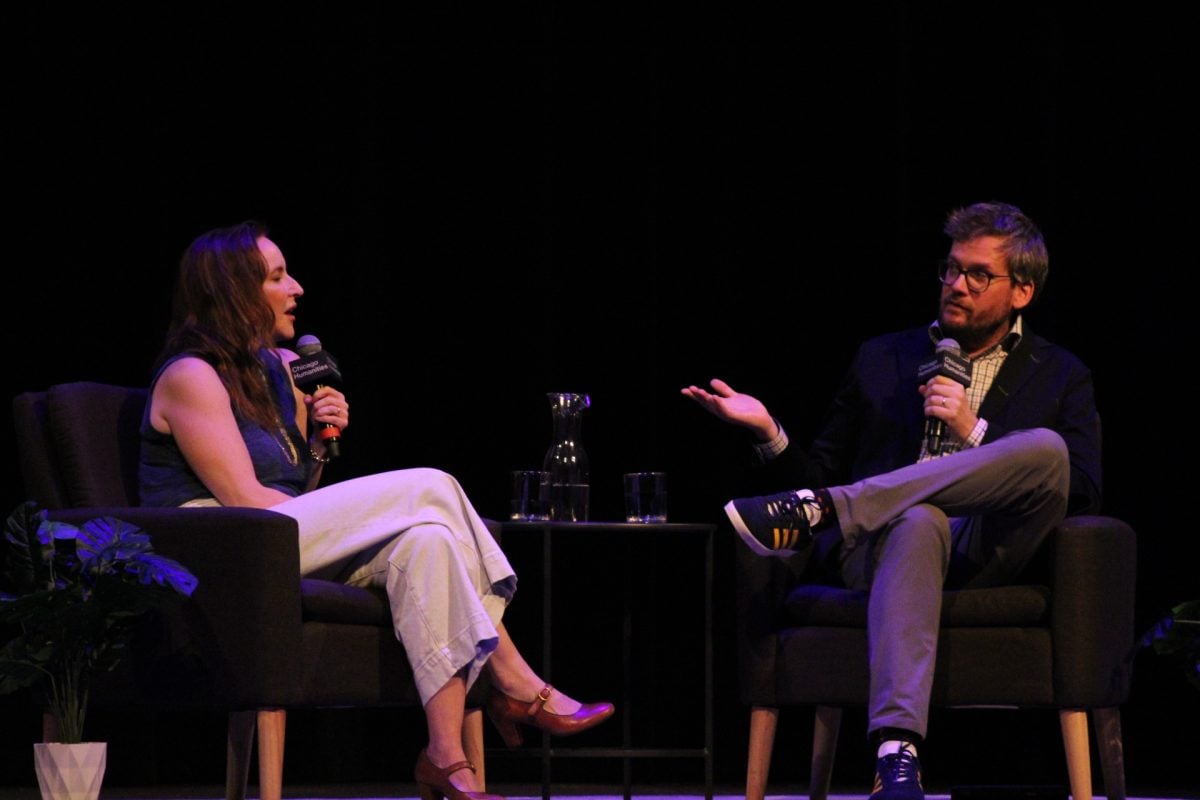Writers John Green and Rebecca Makkai gave advice on fiction writing in Cahn Auditorium Saturday as part of the Chicago Humanities Festival.
Green and Makkai, both fiction authors, discussed their handling of creative blocks as well as audience criticism and perceptions of authors inserting themselves in stories.
Green’s bestselling novels include “The Fault in Our Stars” and “Looking for Alaska.” His 2023 release “The Anthropocene Reviewed” and the upcoming “Everything Is Tuberculosis” are both nonfiction.
He said he worried about not producing work that would meet audience expectations after releasing his most recent fiction work, “Turtles All the Way Down,” in 2017.
“I didn’t know what fiction was for,” Green said. “I’d always felt very confident and comfortable knowing that fiction matters, and storytelling is at the core of who we are and what we do. Suddenly, that got pulled out from underneath me, for whatever reason. That’s why I turned to nonfiction.”
Makkai, whose novel “The Great Believers” was a Pulitzer Prize finalist, released her latest book “I Have Some Questions for You” last year. She also teaches graduate fiction writing at Northwestern, UNR at Lake Tahoe and Middlebury College.
Makkai said many students tell her they feel unproductive even after researching and editing their stories outside of class. However, these steps comprise most of the writing process, she said.
“Think about any art form and the amount of work someone does that the audience doesn’t see,” Makkai said. “As writers, we can feel like it would be such a waste to throw away words, forgetting that maybe the audience should only see five percent.”
She said she has become familiar with her work rhythms to know when she can and cannot write. During a writing residency, she said she wrote 40,000 words in three weeks.
Weinberg freshman and event attendee William Clark said he could relate to this approach.
“That’s kind of how I always work on things,” Clark said. “It’s cool to know that professional people who are known in their craft and respected aren’t always the typical understanding of how someone works on things.”
Green said his ideas come from his own experiences. For example, he said he has watched basketball games from the perspective of a character for a potential book.
Even if he does not include these thoughts in the final story, he said he enjoys deleting portions of his drafts.
“That’s the funnest — I’m sticking with it,” he said when the audience laughed. “That’s the funnest part. Stripping it down makes it sound the way you actually want it.”
Both writers said they found joy in research, especially while visiting different locations to plan out settings in their stories.
This perspective was new to event attendee and Brown University graduate student Youna Choi.
Choi moved to the U.S. from South Korea at 5 years old. Despite her love of reading, she struggled in English classes and with the pressure to write well, she said.
“I somehow have to do a very good job, but nobody’s telling me how, and they’re just telling me to do it better,” Choi said. “The way they framed it like exploring something and how it’s like play really resonated with me.”
Choi said she liked the event format, involving two authors in conversation rather than a formal interview.
The festival’s Executive Director Phillip Bahar said festival curators invited speakers with backgrounds both similar and different to their own.
“Authors or powerful minds can shape our understanding of the world,” Bahar said. “Having these voices around us telling these stories is important, and it allows us to see our world differently, connect with people differently and understand ourselves better.”
The talk also brought Green to a realization.
When Makkai asked him about burnout, he began by saying he confronted it “poorly,” evoking laughter from the audience. Ultimately, though, he said he never stopped thinking about his stories.
“It’s like a child’s game, so ridiculously fun,” Green said. “Now I’m remembering why I like to write fiction. It’s because it’s fun.”
Email: [email protected]
Related Stories:
— Actor Bob Odenkirk discusses his new children’s book at NU for Chicago Humanities Festival
— Chicago Humanities Festival welcomes Sandra Cisneros to NU






